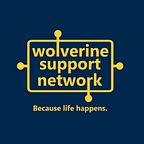Something to Take With Me — Jackson Gray
I arrived on campus at the University of Michigan in the fall of 2016 feeling the same way as many college freshmen — nervous, excited, and entirely clueless about the way my life would unfold over the next four years. When my parents left campus to return home, the freedom of being on my own for the first time was exhilarating. The next few weeks of college life — filled with tailgates, new friends, and my first college courses — cemented my love for this new independence. In time, however, familiar old feelings began to creep in.
Throughout high school, I experienced anxiety in waves. To combat this, I tried my best to just grit my teeth through the days that my mind was overwhelmed with anxious thoughts, optimistic that they would soon pass. I believed that by just muscling through quietly, I would eventually be able to feel the way on the inside that I was projecting outwardly to my friends and family — calm, cool, collected, and, above all else, totally okay. To me, emotional vulnerability felt like a weakness; while I had tried therapy in prior years, I never allowed myself to buy in. My fear of revealing personal information to a complete stranger brought on those same racing thoughts I was trying to avoid — so why try to open up at all?
When those same anxious feelings returned as I began classes at Michigan, it became clear to me that I would not be able to continue to deal with them in the same fashion. The added responsibility of being away from home caused me to feel more pressure than ever to project an image of capability and control. After hearing about WSN from older friends I had met through my fraternity, I signed up for a weekly group. If nothing else, joining a club was another way of proving to myself and others that I was on top of my young college life. And hey, if these older college guys were involved in something with mental health, it didn’t sound like too big of a risk to try it out for myself.
As I walked from my dorm to my first WSN group meeting, a familiar feeling of panic began to set in. Was this room of strangers going to start sharing their deepest fears? Would they ask me to speak about my own struggles? What I found was not a group of people prodding each other to reveal their struggles with mental health, but students who elected to be there and were open to whatever discussion the meeting may present. That first group showed me that WSN could be an escape from everything else I was dealing with. Slowly but surely, those weekly meetings showed me the power of collective empathy. Even further, I was captivated by the way that my group leaders were able to facilitate conversation in a way that made every member feel as though they could use the space in the way they wanted — myself included. Not only did I admire the work that they were doing, but I felt compelled to try and do the same.
After becoming a WSN leader at the end of my freshman year, I felt I had found a place where I could be truly vulnerable. My fellow leaders accepted and supported me, and in a short time they knew more about my struggles than virtually anyone else ever had. For the first time, I genuinely felt comfortable with the idea that it’s okay to not be okay. Being honest with others helped me to be more honest with myself on a daily basis. Just as many other WSN leaders will tell you, the lessons we learn through this role extend beyond the organization itself. From gaining the courage to revisit a professional therapist to becoming a resource for friends who have found themselves struggling with mental illness, mental health and well-being continue to impact nearly every part of my life.
Serving as the Director of Business Development this year gave me the opportunity to pay back some of the gifts that the organization has given me. WSN thrives on the dedication of those who pour so much of their time and effort into it, and I am so grateful to have been able to contribute to that culture alongside my incredible director team. Even though my time at Michigan has come to an end, I will continue to embrace vulnerability as I enter the next phase of my life.
